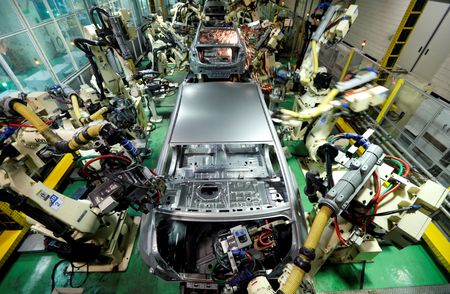 1
1 1
1

SEOUL (Reuters) – Activity in South Korea’s factories expanded at the fastest pace in three months in December but the economy struggled to gather momentum as rising global coronavirus cases and continued supply constraint weighed on production and overseas demand.
The IHS Markit purchasing managers’ index (PMI) for the final month of the year rose to 51.9 from 50.9 in November, remaining above the 50 threshold that indicates expansion in activity for a 15th consecutive month.
The survey on Monday showed output continued to shrink on supply chain constraints, with firms facing semiconductor chip shortages and weak demand, though the pace was the mildest in three months.
New orders – which have the largest weighting in the PMI – grew at a faster pace as domestic demand conditions improved, offsetting sluggish overseas sales.
“Survey data showed new export orders falling for the first time since September 2020, which firms attributed to rising COVID-19 cases globally, congestion at ports and a lack of available shipping containers,” said Joe Hayes, senior economist at IHS Markit.
Manufacturers continued to face acute cost pressures, notably in oil, natural gas, ores and electronics prices, which led them to pass higher charges on to clients.
Firms, however, remained optimistic over the coming year that supply chain pressure would ease as global economic conditions improve and on hopes for new product developments.
That led to a pick up in hiring, following two straight months of job shedding, with the rate of growth accelerating to a six-month high.
Still, economist say supply shortages need to show significant improvement for manufacturing to make a solid turnaround.
“Given South Korea’s prominence in the automotive and electronics industries, substantial improvements in global supply chains will be required before we see a meaningful acceleration in manufacturing growth,” Hayes said.
(Reporting by Joori Roh; Editing by Sam Holmes)